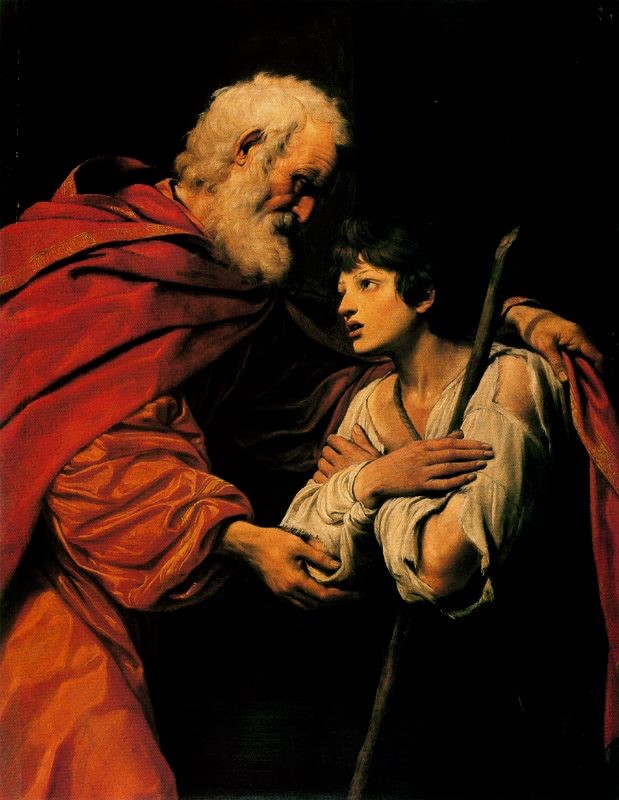Rehearsing Our Lines
The Friday Reflection by James M. Kushiner
February 26th, 2021

J
esus said, "I am with you always, even unto the end of the age." No man has ever made such a claim. Christians know it to be true. "Our Saviour teaches us every day with His own voice," reads a line from the matins of the Orthodox Sunday of the Prodigal Son, before Lent. Reading the red-letter words spoken by Jesus in the Gospels is not like reading the words of Plato or Cicero. Christ's living voice is still heard. His teachings and parables are towering monuments of truth, mileposts marking the road to the Kingdom of God.
On the Sunday of the Prodigal Son, Luke 15:11-32 is read. Fr. Thomas Hopko noted in his podcast on the parable that educated people today would know the basic story of the Prodigal Son. I doubt that is true any longer. Another inheritance has been squandered.
I've enjoyed this parable many times dramatized during Lent by our Sunday School children. If you're playing the role of the Prodigal Son, your first scene is easy, just one line to memorize:
"Father, give me the share of the estate that falls to me."
Within the imaginary world of the parable, the son must have rehearsed that line many times in his mind before summoning the nerve to make his shocking demand. But once spoken, it was decisive. (We can also tiptoe our way into sin.)
We know what happens to our Prodigal, who has no more spoken lines until this scene:
"...and he began to be in need. And he went and attached himself to one of the citizens of that country, and he sent him into his fields to feed swine. And he was longing to fill his stomach with the pods that the swine were eating, and no one was giving anything to him. But when he came to his senses, he said, 'How many of my father's hired men have more than enough bread, but I am dying here with hunger! I will get up and go to my father, and will say to him, "Father, I have sinned against heaven, and in your sight; I am no longer worthy to be called your son; make me as one of your hired men."'"
In this scene, the son's lines are longer so there's more to memorize and rehearse. Plus, these lines imply a rehearsal within the world of the play: "I will...say to him, 'Father, I have sinned against heaven, and in your sight; I am no longer worthy to be called your son; make me as one of your hired men."'
When he "came to his senses" (literally, "came to himself") and got up and left, he had plenty of time to rehearse the lines he planned to say to his father, very different than the one he said to him earlier.
When his father ran and met him on the road, the son said his lines, but was cut off by his father before he could finish, "make me as one of your hired men." He was upstaged by his father, so to speak. We know the rest of the story.
One thing sticks with me about the son's earlier predicament: he "attached himself to" a man and tended his pigs. The "attached" is a participle of kollao, to glue or fasten together. Some translations say "joined" or "hired himself out." I don't favor the latter, which implies agreed upon wages. It seems closer to desperate servitude, near slavery. His "employer" or master does not even feed him properly, not even minimally.
And so, he remembers how his forgettable father fed his hired servants: very well. He is not worthy of being treated as a son, but he hopes to be hired and fed and protected. He will renounce and flee his present servitude in exchange for a more benevolent one.
In the texts for Matins of the Prodigal Son, he admits "my sins have brought me to poverty," "I have lost possession of myself," and have "become the slave of strangers," and now the "depth of sin ever holds me fast."
The Lord, whose voice we still hear every day, says to us, "everyone who commits sin is the slave of sin." (John 8:34)
We're given the Parable of the Prodigal for many reasons and lessons, but one is surely to remind us of our stage directions and lines whenever we bow in servitude to sin: Flee! "I will get up and go to my father, and I will say, Father, I have sinned..." The Father sees us, even "while still a long way off." No time to waste, no inheritance to squander. Arise and go! Every day, says Jesus, who still gives us our lines.
Yours for Christ, Creed & Culture,

James M. Kushiner
Executive Director, The Fellowship of St. James
—James M. Kushiner is Executive Editor of Touchstone: A Journal of Mere Christianity, and Executive Director of The Fellowship of St. James.







